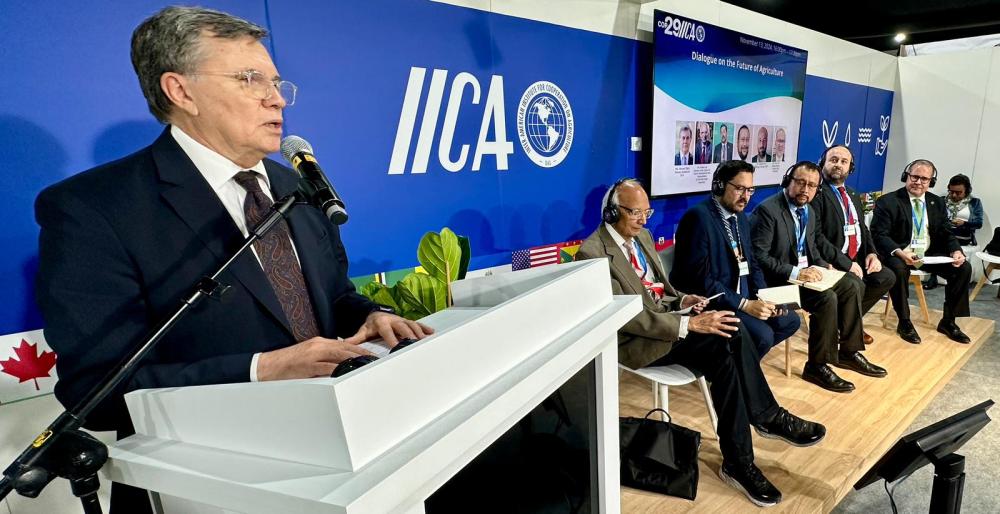The discussion took place at the Home of Sustainable Agriculture of the Americas, the pavilion installed by the Inter-American Institute for Cooperation on Agriculture (IICA) at the Olympic Stadium in Baku, Azerbaijan’s capital city – the venue of COP 29.

BAKU, Azerbaijan, 14 November 2024 (IICA) – A debate on the future of agriculture, and its role in ensuring food security, the mitigation of climate variability, economic development and political and social stability, emerged as some of the strong points of a panel discussion at COP29, the planet’s premier environmental negotiation forum.
The discussion took place at the Home of Sustainable Agriculture of the Americas, the pavilion installed by the Inter-American Institute for Cooperation on Agriculture (IICA) at the Olympic Stadium in Baku, Azerbaijan’s capital city – the venue of COP 29.
Participating in the discussion were IICA Director General, Manuel Otero; Ohio State University professor, Rattan Lal (who is a Nobel Peace Prize and World Food Prize laureate, considered to be the world’s leading authority on soil sciences); Ignacio Lorenzo, the Director of Climate Action at CAF-Development Bank of Latin America and the Caribbean; José Abelardo Mai, the Minister of Agriculture and Food Security of Belize; and Andrea Porro, the Secretary General of the World Farmers’ Organization (WFO).
IICA Deputy Director General, Lloyd Day, moderated the debate, which addressed the challenges facing agriculture and food security and spoke of the need to produce increasingly more, with less. This agrifood agenda is also occupying an increasingly prominent role at COP in Baku.
Otero, who opened the discussion, recalled that a large city with an average of 10 million inhabitants would require 6,000 tons of food daily. Thus, he noted the strategic nature of sustainable, productive, efficient and inclusive agriculture in maintaining social peace.
The IICA Director General maintained that, “We have to produce more food, using fewer natural resources and recognizing the new challenges that agriculture faces. To overcome them, it is critical that we harness science, technology and innovation, while making them more available to family farmers”.
Otero noted that the next 25 years up to 2050 will be the most important and decisive years for agriculture in the last 10,000 years. “We will have to feed 2 billion additional people, even in the context of new challenges”, he reflected.
Lloyd Day pointed out that farmers have always had to face these challenges and therefore would succeed in producing more in a smaller land area and with less water.
Along the same lines Minister Mai recalled that the Green Revolution of U.S. geneticist Norman Borlaug enabled the world to abandon theories that suggested that an increase in population would push humanity into a state of hunger.
Mai noted that, “Problems did occur, but not the ones that we had anticipated. It is important to educate our youth about the future and to devise strong policies to support climate smart and sustainable agriculture. We need to provide incentives to encourage mitigation – incentives for farmers”.
Professor Rattan Lal, IICA Goodwill Ambassador, remarked, not simply with conviction, but with certainty, that, “I am honored to know that agriculture has a brilliant future”.
However, he did point out challenges, such as soil degradation and stressed the need for soil rehabilitation.
Lal, one of the world’s most eminent scientists, also demanded “respect for the profession of farmers and their ecosystem services” and agreed with Minister Mai about the critical need to “educate children about the importance of agriculture”. He also insisted that farmers be paid to sequester carbon.
Andrea Porro argued that “the voice of farmers must be heard” and called for better access to financing to boost climate action”.
He explained that, “In many countries, climate financing for small farmers is insufficient and supporting farmers to assist them to grow should be a major objective. They are more than producers; they are members of society. They have solutions that must be heard; and they must also be supported”.
CAF executive, Lorenzo, emphasized the importance of interinstitutional collaboration, pointing out its importance in terms of financing entities like IICA, “that understand technical cooperation, so that they can assist in designing new products, with an appreciation of the diversity of the sector”.
He assured the audience that, “We are trying to build partnerships to provide innovative financing that will allow farmers to earn additional income, through conservation and the reduction of emissions”.
More information:
Institutional Communication Division.
comunicacion.institucional@iica.in











